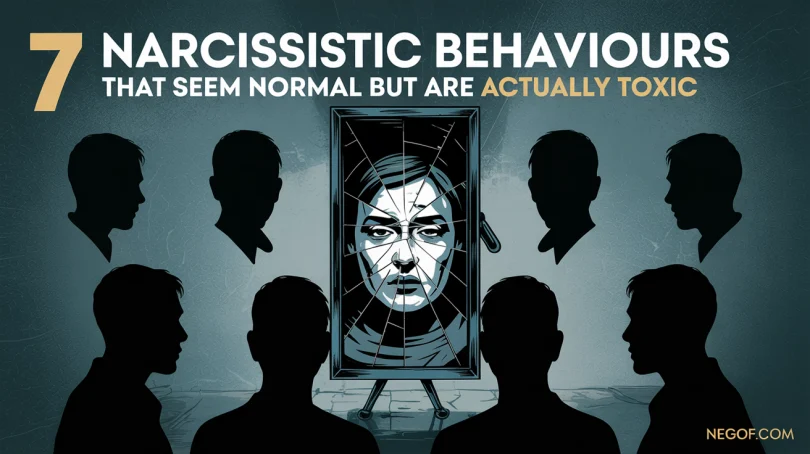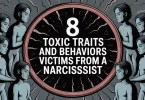The thing about narcissistic individuals and their behavior is that we don’t always recognize it as abuse. It’s not always because we’re naive to their behavior. Narcissists have ways of pacifying people, making their actions seem normal, and creating self-doubt in others.
This causes people to go against their instincts because they lack concrete evidence or proof to say, “Hang on a minute, no, that’s not what you meant by that.” Narcissists often rely on plausible deniability to avoid accountability.
Hidden Manipulation Tactics
Narcissistic individuals rarely show their true nature outright. Instead, their manipulation is often wrapped in gifts, generosity, and behaviors that appear selfless, normal, or even caring at first glance. On the surface, narcissistic individuals may seem like everybody else. However, beneath this facade, their actions are designed to manipulate, control, confuse, and break down your sense of self.
Love Bombing and Flattery
Narcissistic individuals frequently use excessive flattery and love bombing, which can feel like genuine compliments or care, especially at the start of a relationship. They shower you with affection, attention, gifts, false promises, and constant messages, appearing caring, kind, and romantic. However, every action is a transaction a tactic to make you dependent on their approval. Once they’ve secured your trust, the affection often disappears, leaving you chasing after the person they pretended to be.
Related Topics:
5 Weird Ways Toxic Family Members Punish a Truthteller for Going No Contact
8 Signs You’re in a Narcissistic Relationship
7 Nice Things Covert Narcissists Do to Secretly Control You
Narcissistic Parenting
The thing about narcissistic parents is that they don’t treat you all the time. One minute, they’re criticizing or mocking you or making jokes at your expense; the next, they’re treating you to ice cream. This inconsistency is very difficult for a young child to understand, creating confusion and emotional turmoil.
Disguised Criticism
Narcissists often disguise their insults as “helpful criticism.” In genuine relationships whether friendships or parent-child dynamics constructive feedback is meant to help you improve and benefit you. Narcissistic individuals, however, frame their insults as advice, claiming they’re “just trying to help,” “being honest,” or “saying it because they care.
” When their words slowly chip away at your confidence, making you feel inadequate and reliant on them for validation, it’s a sign that criticism is more about control than support. True constructive feedback leads to positive outcomes, where you can say, “Thanks for the advice; that helped.” Narcissistic criticism, on the other hand, often sets you up for failure.
Common Narcissistic Behaviors
Sabotage and Victim Playing
Narcissists frequently sabotage others and play the victim to gain sympathy. If you dare to call them out or confront them about their toxic or hurtful behavior, they’ll flip the narrative. They might say, “How could you think that of me? After all, I’ve been through, this is how you treat me?” This makes you feel guilty for trying to hold them accountable, causing you to question your motives and intentions rather than their behavior.
Backhanded Compliments
Narcissists use backhanded compliments to subtly put you down while appearing supportive. They might say, “You look nice today, for once,” or, “I didn’t think you’d be able to achieve that.” These comments are designed to cause you to doubt yourself and their intentions. If you question their motives, they play the victim, saying, “I was only trying to compliment you. I guess I won’t bother in the future.” This shifts the blame onto you, making you feel unreasonable.
Blame-Shifting and Gaslighting
Narcissists never take responsibility for their actions, especially if they paint them in a negative light. If they hurt you, they’ll claim it’s because you “made them do it.” They’ll be insensitive and accuse you of being too sensitive, create chaos and call you dramatic, or push your buttons and label you as overreacting or crazy.
They provoke insecurities and accuse you of being jealous, lie to you, and claim they did so because they “knew you’d react like this,” or rewrite reality to avoid accountability. They may make jokes at your expense, insult you, and then claim they were “only joking,” shifting the blame back to you for not being able to “take a joke.” Over time, this erodes your self-esteem, allowing them to continue their hurtful behavior without consequences.
Silent Treatment as Punishment
Narcissists often use the silent treatment, disguised as “needing space,” as a form of punishment. While everyone may need space occasionally, genuine conflicts arising from miscommunication can be resolved with mutual effort. With narcissists, however, the silent treatment is a passive-aggressive tactic.
If you say no to them or fail to give them the admiration they crave, they become offended and withdraw affection, ignore you, or punish you with silence. They stir up conflict, fail to resolve it, and then blame you for trying to address the issue, claiming you’re the problem for not giving them space. This leaves you feeling guilty for attempting to resolve the issue, even though they refused to engage. As a result, nothing gets resolved.
Protecting Yourself from Narcissistic Abuse
The best way to deal with narcissistic individuals is to recognize their toxic patterns of behavior so you can protect yourself. These behaviors, when part of a consistent pattern, are not normal they’re manipulative. Trust your instincts; they often sense the truth even when you lack concrete evidence. Set healthy boundaries and surround yourself with people who support you as you support them, not those who make you question your worth.







Leave a Comment